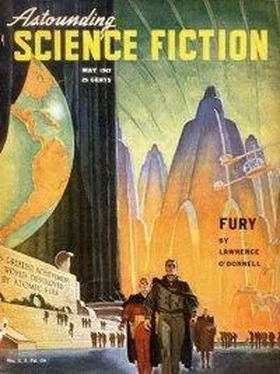Thomas Sherred - E for Effort
Здесь есть возможность читать онлайн «Thomas Sherred - E for Effort» весь текст электронной книги совершенно бесплатно (целиком полную версию без сокращений). В некоторых случаях можно слушать аудио, скачать через торрент в формате fb2 и присутствует краткое содержание. Год выпуска: 1947, Издательство: Street & Smith Publications, Inc., Жанр: Фантастика и фэнтези, на английском языке. Описание произведения, (предисловие) а так же отзывы посетителей доступны на портале библиотеки ЛибКат.
- Название:E for Effort
- Автор:
- Издательство:Street & Smith Publications, Inc.
- Жанр:
- Год:1947
- ISBN:нет данных
- Рейтинг книги:3 / 5. Голосов: 1
-
Избранное:Добавить в избранное
- Отзывы:
-
Ваша оценка:
- 60
- 1
- 2
- 3
- 4
- 5
E for Effort: краткое содержание, описание и аннотация
Предлагаем к чтению аннотацию, описание, краткое содержание или предисловие (зависит от того, что написал сам автор книги «E for Effort»). Если вы не нашли необходимую информацию о книге — напишите в комментариях, мы постараемся отыскать её.
E for Effort — читать онлайн бесплатно полную книгу (весь текст) целиком
Ниже представлен текст книги, разбитый по страницам. Система сохранения места последней прочитанной страницы, позволяет с удобством читать онлайн бесплатно книгу «E for Effort», без необходимости каждый раз заново искать на чём Вы остановились. Поставьте закладку, и сможете в любой момент перейти на страницу, на которой закончили чтение.
Интервал:
Закладка:
“ ‘Carl Wilhelm Kessler.’ ” A snarl.
“These men are wanted by the Government of the United States of America, to stand trial on charges ranging from criminal syndicalism, incitement to riot, suspicion of treason—”
I clicked off the radio. “Well?” to no one in particular.
Bernstein opened his eyes. “The rurales are probably on their way. Might as well go back and face the music—” We crossed the border at Juarez. The FBI was waiting.
Every press and radio chain in the world must have had coverage at that trial, every radio system, even the new and imperfect television chain. We were allowed to see no one but our lawyer. Samuels flew from the West Coast and spent a week trying to get past our guards. He told us not to talk to reporters, if we ever saw them.
“You haven’t seen the newspapers? Just as well—How did you ever get yourselves into this mess, anyway? You ought to know better.”
I told him.
He was stunned. “Are you all crazy?”
He was hard to convince. Only the united effort and concerted stories of all of us made him believe that there was such a machine in existence. (He talked to us separately, because we were kept isolated.) When he got back to me he was unable to think coherently.
“What kind of defense do you call that?”
I shook my head. “No. That is, we know that we’re guilty of practically everything under the sun if you look at it one way. If you look at it another—”
He rose. “Man, you don’t need a lawyer, you need a doctor. I’ll see you later. I’ve got to get this figured out in my mind before I can do a thing.”
“Sit down. What do you think of this?” and I outlined what I had in mind.
“I think … I don’t know what I think. I don’t know. I’ll talk to you later. Right now I want some fresh air,” and he left.
As most trials do, this one began with the usual blackening of the defendant’s character, or lack of it. (The men we’d blackmailed at the beginning had long since had their money returned, and they had sense enough to keep quiet. That might have been because they’d received a few hints that there might still be a negative or two lying around. Compounding a felony? Sure.) With the greatest of interest we sat in that great columned hall and listened to a sad tale.
We had, with malice aforethought, libeled beyond repair great and unselfish men who had made a career of devotion to the public weal, imperiled needlessly relations traditionally friendly by falsely reporting mythical events, mocked the courageous sacrifices of those who had dulce et gloria mori, and completely upset everyone’s peace of mind. Every new accusation, every verbal lance drew solemn agreement from the dignitary-packed hall. Against someone’s better judgment, the trial had been transferred from the regular courtroom to the Hall of Justice. Packed with influence, brass, and pompous legates from all over the world, only the congressmen from the biggest states, or with the biggest votes were able to crowd the newly installed seats. So you can see it was a hostile audience that faced Samuels when the defense had its say. We had spent the previous night together in the guarded suite to which we had been transferred for the duration of the trial, perfecting, as far as we could, our planned defense. Samuels has the arrogant sense of humor that usually goes with supreme self-confidence, and I’m sure he enjoyed standing there among all those bemedaled and bejowled bigwigs, knowing the bombshell he was going to hurl. He made a good grenadier. Like this:
“We believe there is only one defense possible, we believe there is only one defense necessary. We have gladly waived, without prejudice, our inalienable right of trial by jury. We shall speak plainly and bluntly, to the point.
“You have seen the picture in question. You have remarked, possibly, upon what has been called the startling resemblance of the actors in that picture to the characters named and portrayed. You have remarked, possibly, upon the apparent verisimilitude to reality. That I will mention again. The first witness will, I believe, establish the trend of our rebuttal of the allegations of the prosecution.” He called the first witness.
“Your name, please?”
“Mercedes Maria Gomez.”
“A little louder, please.”
“Mercedes Maria Gomez.”
“Your occupation?”
“Until last March I was a teacher at the Arizona School for the Deaf. Then I asked for and obtained a leave of absence. At present I am under personal contract to Mr. Lefko.”
“If you see Mr. Lefko in this courtroom, Miss… Mrs.—”
“Miss.”
“Thank you. If Mr. Lefko is in this court will you point him out? Thank you. Will you tell us the extent of your duties at the Arizona School?”
“I taught children born totally deaf to speak. And to read lips.”
“You read lips yourself, Miss Gomez?”
“I have been totally deaf since I was fifteen.”
“In English only?”
“English and Spanish. We have… had many children of Mexican descent.”
Samuels asked for a designated Spanish-speaking interpreter. An officer in the back immediately volunteered. He was identified by his ambassador, who was present.
“Will you take this book to the rear of the courtroom, sir?” To the Court: “If the prosecution wishes to examine that book, they will find that it is a Spanish edition of the Bible.” The prosecution didn’t wish to examine it.
“Will the officer open the Bible at random and read aloud?” He opened the Bible at the center and read. In dead silence the Court strained to hear. Nothing could be heard the length of the enormous hall.
Samuels: “Miss Gomez. Will you take these binoculars and repeat, to the Court, just what the officer is reading at the other end of the room?”
She took the binoculars and focused them expertly on the officer, who had stopped reading and was watching alertly. “I am ready.”
Samuels: “Will you please read, sir?”
He did, and the Gomez woman repeated aloud, quickly and easily, a section that sounded as though it might be anything at all. I can’t speak Spanish. The officer continued to read for a minute or two.
Samuels: “Thank you, sir. And thank you, Miss Gomez. Your pardon, sir, but since there are several who have been known to memorize the Bible, will you tell the Court if you have anything on your person that is written, anything that Miss Gomez has no chance of viewing?” Yes, the officer had. “Will you read that as before? Will you, Miss Gomez—”
She read that, too. Then the officer came to the front to listen to the court reporter read Miss Gomez’s words.
“That’s what I read,” he affirmed.
Samuels turned her over to the prosecution, who made more experiments that served only to convince that she was equally good as an interpreter and lipreader in either language.
In rapid succession Samuels put the rest of the lipreaders on the stand. In rapid succession they proved themselves as able and as capable as Miss Gomez, in their own linguistic specialty. The Russian from Ambridge generously offered to translate into his broken English any other Slavic language handy, and drew scattered grins from the press box. The Court was convinced, but failed to see the purpose of the exhibition. Samuels, glowing with satisfaction and confidence, faced the Court.
“Thanks to the indulgence of the Court, and despite the efforts of the distinguished prosecution, we have proved the almost amazing accuracy of lipreading in general, and these lipreaders in particular.” One Justice absently nodded in agreement. “Therefore, our defense will be based on that premise, and on one other which we have had until now found necessary to keep hidden—the picture in question was and is definitely not a fictional representatian of events of questionable authenticity. Every scene in that film contained, not polished professional actors, but the original person named and portrayed. Every foot, every inch of film was not the result of an elaborate studio reconstruction but an actual collection of pictures, an actual collection of newsreels—if they can be called that—edited and assembled in story form!”
Читать дальшеИнтервал:
Закладка:
Похожие книги на «E for Effort»
Представляем Вашему вниманию похожие книги на «E for Effort» списком для выбора. Мы отобрали схожую по названию и смыслу литературу в надежде предоставить читателям больше вариантов отыскать новые, интересные, ещё непрочитанные произведения.
Обсуждение, отзывы о книге «E for Effort» и просто собственные мнения читателей. Оставьте ваши комментарии, напишите, что Вы думаете о произведении, его смысле или главных героях. Укажите что конкретно понравилось, а что нет, и почему Вы так считаете.












